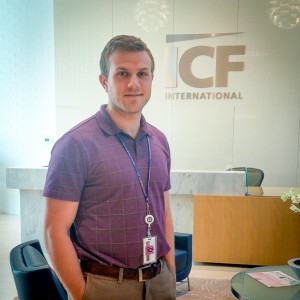Recent graduate Jordan Hollinger landed his dream job in energy and environmental policy, after an undergraduate internship that included professor-mentored research on the local economic impacts of Eastern Mennonite University’s solar energy installation.
Hollinger actually got his job before he graduated, moving to the Washington D.C. area in the summer of 2014. He finished his last class (calculus) online while beginning a research assistant position at ICF International. Hollinger now works exclusively with data analysis and power sector modeling for the Environmental Protection Agency’s Clean Air Markets Division.
But he’s is still enjoying other long-term benefits of his internship: the research he contributed to was recently published by his mentor and collaborator, business professor Anthony Smith, in the May/June issue of SolarToday, the magazine of the American Solar Energy Society.
The economic benefits of solar panels

Hollinger interned in the spring and summer of 2014 at Secure Futures, which installed the solar panels on EMU’s Hartzler Library. Smith, who owns the Staunton-based company, suggested Hollinger investigate if EMU’s solar photovoltaic (PV) project provided any economic benefits to other ratepayers within the Harrisonburg territory.
Opponents say solar hurts local ratepayers by raising the stranded electricity generation costs for non-solar customers. Proponents say the opposite is true, that when solar is in use, energy costs go down and other economic and health benefits accrue for all ratepayers within a given area.
“Tony had this idea that since his company had data from EMU, we might be able to work with the Harrisonburg Electric Commission to actually test this claim and see if it is true,” Hollinger said. “We found that within this scenario, distributed solar is a benefit, not a big one, but not a negative impact either.”
Hollinger cautioned that the analysis was for a very specific location with a non-generating utility company and that findings might be different in different scenarios.
Internship helps determine career path
By the end of his internship, Hollinger knew he wanted to work in environmental policy, or renewable energy research and data, so he began applying to jobs that seemed to fit those requirements. The ICF International job was “completely random, just something I stumbled onto online and applied for.”
Within a month of applying, the company hired him. Hollinger thinks his experience at Secure Futures paved the way there. Smith agrees that Hollinger’s experience at Secure Futures may have proven to be a differentiating factor.
Hollinger “developed a lot of high value expertise very quickly about the economics of renewable energy and he was able to translate that into a positive result for himself,” Smith said. “And he is overall a very sharp guy. He deserves his own credit for that.”

Hollinger is now part of a six-member team that helps “the EPA model their environmental regulations as related to the US power sector,” he said. When the EPA is considering a new regulation, policymakers need to know what kind of an impact it could have both on the environment and the national economy. So Hollinger and his team use ICF International’s Integrated Planning Model along with EPA-directed scenarios, to help representatives determine what regulations would work best if passed. On the team, Hollinger works with data analysis and manipulation.
One example of a project he has worked on is modeling the effects of a proposed piece of EPA legislation called The Clean Power Plan. The plan would establish carbon pollution standards for existing power plants. Hollinger’s team has been running scenarios for the EPA and producing data that shows “if these are the standards you wish to set, then this will be the cost, this will be the impact.”
Hollinger said his close relationship with Smith and other professors helped guide him onto his current career path. “I was one of the first people to major in environmental sustainability and economics,” he said. “I wasn’t immediately sure how those two fit together, but through conversations with professors and classes that taught me to be a critical thinker, I began to figure it out.”
